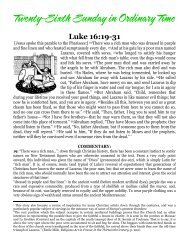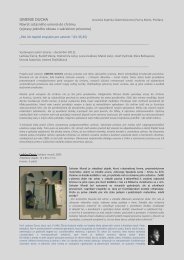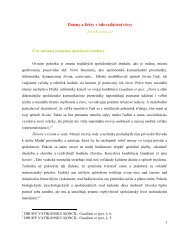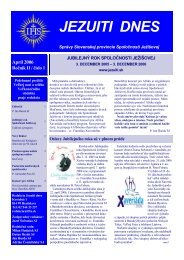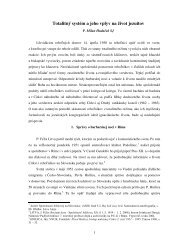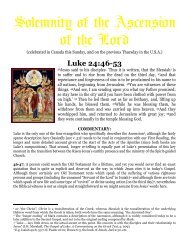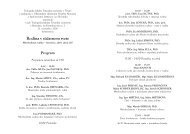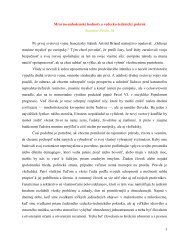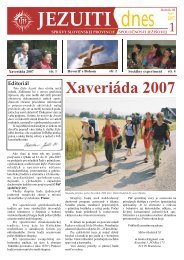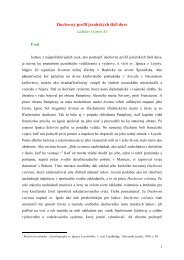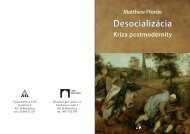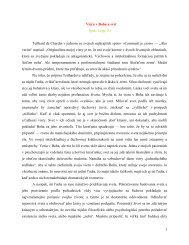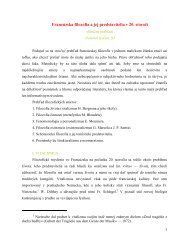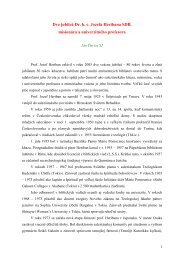Fourth Sunday of Advent - Jezuiti
Fourth Sunday of Advent - Jezuiti
Fourth Sunday of Advent - Jezuiti
Create successful ePaper yourself
Turn your PDF publications into a flip-book with our unique Google optimized e-Paper software.
<strong>Fourth</strong> <strong>Sunday</strong> <strong>of</strong> <strong>Advent</strong><br />
Luke 1:39-45<br />
39 In those days Mary set out and went with haste to a Judean town in the hill country,<br />
40 where she entered the house <strong>of</strong> Zechariah and greeted Elizabeth.<br />
41 When Elizabeth heard Mary’s greeting, the child leaped in her<br />
womb. And Elizabeth was filled with the Holy Spirit 42 and<br />
exclaimed with a loud cry, “Blessed are you among women, and<br />
blessed is the fruit <strong>of</strong> your womb. 43 And why has this happened to<br />
me, that the mother <strong>of</strong> my Lord comes to me? 44 For as soon as I<br />
heard the sound <strong>of</strong> your greeting, the child in my womb leaped for<br />
joy. 45 And blessed is she who believed that there would be a<br />
fulfillment <strong>of</strong> what was spoken to her by the Lord.”<br />
COMMENTARY:<br />
Today’s reading needs to be understood within the larger framework <strong>of</strong> the<br />
very deliberate parallels and contrasts that Luke draws in his early chapters<br />
between John the Baptist and Jesus—a relationship that many authors<br />
speak <strong>of</strong> as a “diptych” (a type <strong>of</strong> painting with two corresponding parts, hinged in the middle): “The<br />
meeting <strong>of</strong> Mary and Elizabeth is a surrogate for the first meeting <strong>of</strong> John and Jesus. Elizabeth speaks<br />
for John and Mary speaks for Jesus. Elizabeth bows and defers to Mary, the first point where the diptych<br />
becomes asymmetrical” (http://girardianlectionary.net/year_c/advent4c.htm).<br />
“All is topsy-turvy here, at least according to ancient standards. A young girl should not be traveling alone in<br />
her own hometown, much less across country—but here is Mary doing so. Young girls do not receive blessings<br />
from old women, but Mary is honored by Elizabeth. Men are generally not privy to prenatal women-speak, but<br />
this private exchange is now broadcast to Luke’s readers. News <strong>of</strong> this magnitude should come from<br />
Jerusalem, the holy city, and the Temple, the divine abode—but this newsworthy episode is situated in the<br />
Judean hill country. And men should be the first to know and speak <strong>of</strong> the work <strong>of</strong> God and to confirm the<br />
angelic message—but in Luke’s narrative this deed falls to an old, secluded, pregnant woman.” (Joel B. Green,<br />
“Hope from Unexpected Places,” Quarterly Review Fall 2000, p. 337)<br />
39-40: Although “in those days” can simply mean “at that time,” it is also a “stock phrase” familiar from<br />
the Hebrew Prophets, where it is <strong>of</strong>ten used in descriptions <strong>of</strong> the coming Messianic Era and the<br />
judgement <strong>of</strong> God. Especially for readers familiar with the Old Testament, this expression could be an<br />
“eschatological hint” that we are crossing a threshold <strong>of</strong> history here, and that, with the events Luke is<br />
narrating, God is beginning to inaugurate the long-awaited era <strong>of</strong> salvation and renewal. It points us to<br />
the fact that, with the conception <strong>of</strong> both John and Jesus, a “new era” is beginning, and the slow but sure<br />
process <strong>of</strong> salvation has begun to unfold. The Promise is beginning to be fulfilled!<br />
“went with haste”: Grk meta spoudēs, “with earnestness, enthusiasm, eagerness, zeal, effort, speed,<br />
diligence, excitement”: highlighting both the importance <strong>of</strong> the message Mary is carrying, but also<br />
demonstrating her deep love and concern for her aged relative, Elizabeth 1 . Despite the earth-shattering<br />
1 The Church Father Origen says that, in addition, this “haste” reflects Christ’s urgency (even within Mary’s womb) to sanctify<br />
John for his prophetic mission. St. Ambrose says that the grace <strong>of</strong> the Holy Spirit, once received, does not allow one to loiter, but<br />
urges one into immediate action!
news Mary has just received, her first instinct is to reach out in love and support to Elizabeth; as the<br />
great mystics have taught, the true mark <strong>of</strong> an authentic spiritual experience (which for Mary occurred in<br />
the Annunciation) is the way it makes the recipient more loving, compassionate, gentle, etc. than they<br />
were before the experience. Mary’s experience <strong>of</strong> the archangel Gabriel, and then <strong>of</strong> the Holy Spirit’s<br />
overshadowing, flows almost seamlessly into service, generosity and love. Some French translations<br />
render this phrase as “avec empressement,” i.e. “she rushed” to see Elizabeth. “When Luke tells us that<br />
… Mary arose and went hastily into the hill country <strong>of</strong> Judea … he is not describing simply her<br />
eagerness to see her relative. Precisely because the angel spoke <strong>of</strong> Elizabeth’s pregnancy as part <strong>of</strong> the<br />
plan <strong>of</strong> God, Mary’s haste reflects her obedience to that plan” (Father Raymond Brown, A Coming<br />
Christ in <strong>Advent</strong>, p. 66). “We ought to see here more than Mary’s considerate kindness toward an elderly<br />
relative. Almost every word <strong>of</strong> Luke’s narrative is potent with meaning. Mary’s haste is an expression <strong>of</strong><br />
her joy, faith and gratitude, themes that dominate the two chapters <strong>of</strong> the infancy narrative up until the<br />
end, when the prophecy <strong>of</strong> Simeon warns that sorrow will also be part <strong>of</strong> discipleship” (Mary Ann<br />
Getty-Sullivan, Women in the New Testament, p. 27).<br />
“…The story as it stands gives some very natural insight into these two women’s experience. They rejoiced in<br />
each other’s pregnancy. They needed each other’s support. They realized how blessed they were to be bearing<br />
God’s miraculous gifts to humanity. What modern mother who willingly and intentionally bears a child does<br />
not sense the same joyful hope that they felt?” (http://www.spirit-net.ca/sermons/c-ad04-js.php)<br />
“Any mother who has ever been with child in faith, who has ever been pregnant in hope, has rushed to the<br />
friend, the compatriot, the spouse, the family and announced the good news. The promise is terribly<br />
precarious. Anything can happen, suddenly, brusquely, and definitively. But the hope remains, and over time<br />
faith’s long labor yields life. In some ways, I think, God is most appropriately thought <strong>of</strong> as a mother.” (Father<br />
John Kavanaugh, SJ, St. Louis University; online)<br />
As commentators point out, this would be a fairly unusual type <strong>of</strong> trip, since women in ancient Jewish<br />
towns were normally confined to their homes for the length <strong>of</strong> the pregnancy. It is even more<br />
extraordinary, since Mary may not yet have taken the second step to formalize her marriage to Joseph—<br />
she is thus a pregnant, unmarried woman (we don’t know from the Gospels precisely when Joseph and<br />
Mary were formally married). “Under Jewish law, Mary should have been arraigned before a priest, and<br />
accused <strong>of</strong> breaking God’s moral law. The Law required that, whether married or betrothed, the <strong>of</strong>fender<br />
should be stoned to death (Deut. 22:24). The home <strong>of</strong> an ordained priest [i.e. Zechariah] would have<br />
been just about the last place Mary would have gone if she had anything to hide” (John Phillips,<br />
Exploring the Gospel <strong>of</strong> Luke, p. 68).<br />
Although the text does not mention it, she would have been accompanied by someone from her family,<br />
to “chaperone” her, especially since she was probably only in her early to mid teens (14-17) at this point.<br />
This is in contrast to Elizabeth, who (like some <strong>of</strong> the Biblical matriarchs) is said to be too old to bear<br />
children (1:7) 2 , and whose sterility can only be reversed by the miraculous intervention <strong>of</strong> God.<br />
“We may suppose that she did not acquaint any <strong>of</strong> her neighbours at Nazareth with the message she had<br />
received from heaven, yet longed to talk over a thing she had a thousand time thought over, and knew no<br />
person in the world with whom she could freely converse concerning it but her cousin Elisabeth, and therefore<br />
she hastened to her. Note, it is very beneficial and comfortable for those that have a good work <strong>of</strong> grace begun<br />
in their souls, and Christ in the forming there, to consult those who are in the same case, that they may<br />
communicate experiences one to another;” (Matthew Henry, Protestant Biblical commentator)<br />
“[Mary’s] visit to Elizabeth suggests that she sought out the nurturing and mothering love <strong>of</strong> an older woman.<br />
Her own mother may have died, or Elizabeth may have been one <strong>of</strong> those people from the older generation<br />
who is in tune with youth and able to support a young person who is in crisis, as Mary was. Clearly, Elizabeth<br />
had such qualities, because she allowed her son, John the Baptist, to grow into his unusual vocation<br />
unencumbered. Perhaps Mary had already spoken with Joseph and seen his hurt and confusion, and even<br />
2 It is tempting for us to think <strong>of</strong> Elizabeth as “elderly” according to our average modern lifespan (75+ years); however, in Jesus’<br />
culture, many people only lived into their fifties or early sixties, so Elizabeth may only have been in her fifties at this point—<br />
presumably past the age <strong>of</strong> menopause. There would, however, still be quite a contrast in ages, since Mary was probably 40 years<br />
younger than Elizabeth.
though these feelings were soon replaced with renewed trust, she may have longed for the less complicated<br />
support than an older woman and family member could <strong>of</strong>fer” (Penelope Duckworth, Mary: The Imagination<br />
<strong>of</strong> Her Heart, p. 16)<br />
“a Judean town in the hill country”: Luke does not specify the exact location, but, since the earliest<br />
centuries, Christian tradition has identified the home-town <strong>of</strong> Zechariah and Elizabeth as Ein Kerem<br />
[Hebrew for “The Well <strong>of</strong> the Vine” or “The Spring <strong>of</strong> the Vineyard”], a small town on the outskirts <strong>of</strong><br />
(and today in the shadow <strong>of</strong>) Jerusalem. In the sixth century, a Byzantine pilgrim named Theodosius<br />
commented that the town was situated about five miles from Jerusalem, and a seventh-century liturgical<br />
calendar from Jerusalem speaks <strong>of</strong> the celebration <strong>of</strong> St. Elizabeth in the town <strong>of</strong> “Enquarium”. The<br />
main Catholic church (<strong>of</strong> St. John the Baptist) is built on the site <strong>of</strong> several earlier ruined churches, and a<br />
cave which is traditionally the site <strong>of</strong> Zechariah and Elizabeth’s house, where John the Baptist was born.<br />
Nearby, the modern Church <strong>of</strong> the Visitation (likewise built over the ruins <strong>of</strong> several earlier sanctuaries)<br />
marks the traditional site <strong>of</strong> the encounter <strong>of</strong> Mary and Elizabeth.<br />
“How exactly did Our Lady make the tiring journey from Nazareth to the place traditionally associated with<br />
the birth <strong>of</strong> John the Baptist, Ein Karem, nearly 100 miles away? Certainly not by camel, although this was the<br />
main means <strong>of</strong> transport in the constant comings and goings on the busy national and international caravan<br />
routes. Mary’s journey, over Judea’s rugged terrain, would have taken between a week and ten days 3 , and the<br />
best method by far (perhaps the only method) would have been by donkey.” (Ruth Rees, The Rosary in Space<br />
and Time, p. 56)<br />
41: The “leaping” <strong>of</strong> John in his mother’s womb 4 has a number <strong>of</strong> layers <strong>of</strong> meaning. In the ancient<br />
world, it was commonly believed that the “quickening” <strong>of</strong> the fetus (the moment when the baby received<br />
its soul) was signified by the baby’s first noticeable movements within the mother. Here, we have, not<br />
simply an ordinary movement <strong>of</strong> a baby, but a dramatic “surging” <strong>of</strong> the unborn child, almost a type <strong>of</strong><br />
“dancing” in the presence <strong>of</strong> the unborn Jesus 5 ; as the Preface for the Solemnity <strong>of</strong> St. John the Baptist<br />
says, “even in the womb he leapt for joy, so near was [our] salvation”—for the ancients, this movement<br />
would signify something even greater than the moment <strong>of</strong> the baby’s reception <strong>of</strong> his soul! In the same<br />
way that King David had leapt and danced with joy in the presence <strong>of</strong> the Ark <strong>of</strong> the Covenant, so John<br />
is leaping and dancing within the confines <strong>of</strong> Elizabeth’s womb. “Mary was filled with the Divine<br />
presence as the ark was with the glory <strong>of</strong> Yahweh. And Mary’s coming to Elizabeth is a source <strong>of</strong><br />
blessing, just as was the coming <strong>of</strong> the ark for the house <strong>of</strong> Obed-edom (2 Sam 6:11). What the Ark <strong>of</strong><br />
the Covenant could only signify (and only in a local way), Mary makes a reality, and in a personal way:<br />
She is an effective sign <strong>of</strong> God’s presence with his people”<br />
(http://campus.udayton.edu/mary/meditations/visitation.html)<br />
Luke’s Gospel also puts particular emphasis on the way in which the gift <strong>of</strong> the Holy Spirit transforms<br />
people into prophets. Here, the Spirit is marking John out as a prophet, even before his birth, and his<br />
actions bear witness to the specialness <strong>of</strong> Mary’s son, just as his words will later do. In these early<br />
chapters <strong>of</strong> John, we see many “ordinary” people being transformed by the prophetic Spirit, and<br />
proclaiming a message that is inspired by God: Zechariah, Mary, and now John 6 and Elizabeth.<br />
3 Others suggest that, on average, Nazareth to Ein Kerem was actually closer to a four-day journey.<br />
4 This particular verb (skirteō / skirtaō) is quite rare in the Gospels, used only in Luke, and only 3x: here (in vv. 41 and 44), and in<br />
one line <strong>of</strong> the Lucan Beatitudes, in 6:23 (“Blessed are you when people hate you, and when they exclude you, revile you, and<br />
defame you on account <strong>of</strong> the Son <strong>of</strong> Man. Rejoice on that day and leap for joy, for surely your reward is great in heaven”). For<br />
Luke, “leaping” seems to be an acknowledgement <strong>of</strong> God’s blessing and action in one’s life.<br />
5 “John’s body talk said it all. The ecstasy <strong>of</strong> that leap in the womb—a religious dance—was its own sort <strong>of</strong> Gospel. It revealed the<br />
sheer joy <strong>of</strong> being filled with God’s Spirit” (Father Alfred A. McBride, The Human Face <strong>of</strong> Jesus: Meditation and Commentary on<br />
the Gospel <strong>of</strong> Luke, p. 21).<br />
St. Ambrose: “Elizabeth was the first to hear the words, but John was the first to experience the grace. Elizabeth heard according to<br />
the natural order, whereas John leapt on account <strong>of</strong> the mystery. Elizabeth perceived Mary’s coming; John perceived the coming <strong>of</strong><br />
the Lord” (Catena Aurea).<br />
6 Back in 1:15, the angel that appeared to Zechariah had promised him that John would be filled with the Holy Spirit, “even from<br />
his mother’s womb”.
Many scholars also see a possible parallel with the “leaping” <strong>of</strong> the brothers Esau and Jacob in their<br />
mother’s womb (Gen 25:22, particularly in the Septuagint Greek translation), in which the “leaping”<br />
hints at a future relationship (in Luke, it is only John who “leaps,” probably in deference to the<br />
superiority <strong>of</strong> Jesus, whereas Esau and Jacob are more or less equals, as brothers) 7 .<br />
42: “Blessed are you among women, and blessed is the fruit <strong>of</strong> your womb”: to many Catholics, these<br />
lines are most familiar because they form part <strong>of</strong> the core <strong>of</strong> the Hail Mary. Elizabeth does not simply<br />
speak these words; on the contrary, the text says that she “shouts them out with a loud voice”.<br />
“Elizabeth, ‘filled with the Holy Spirit,’ was introduced into the depths <strong>of</strong> the mystery <strong>of</strong> the coming <strong>of</strong> the<br />
Messiah. Within her the Holy Spirit worked a special enlightenment, which found expression in the salutation<br />
she addressed to Mary. Elizabeth spoke as if she were participating in and witnessing the annunciation in<br />
Nazareth. In her words, she defined the essence <strong>of</strong> the mystery which was at work at that moment in Mary”<br />
(Pope John Paul II, General Audience, June 13, 1990)<br />
“Blessed” (Greek Εὐλογημένη, eulogēmēnē) here has the sense <strong>of</strong>: “worthy <strong>of</strong> high praise<br />
[eulogiaeulogy] because <strong>of</strong> what God has done in your life” 8 . “Among women”: this has a superlative<br />
sense in Hebrew or Aramaic, that is to say, “You are more blessed than any other woman”; “You stand<br />
out from all women because <strong>of</strong> the blessing you have received”. This first blessing is clearly on account<br />
<strong>of</strong> the great privilege bestowed on Mary, <strong>of</strong> being the mother <strong>of</strong> the long-awaited Messiah. Theophylact,<br />
in his commentary on this verse, notes that sometimes the Greek “and” (kai) can have the sense <strong>of</strong><br />
“because,” and therefore this verse would mean: “Blessed are you among women because the fruit <strong>of</strong><br />
your womb is blessed”.<br />
Similar wording is found in Judges 5:24: “Most blessed <strong>of</strong> women be Jael, the wife <strong>of</strong> Heber the Kenite,<br />
<strong>of</strong> tent-dwelling women most blessed” and Judith 13:18: “O daughter, you are blessed by the Most High<br />
God above all other women on earth; and blessed be the Lord God, who created the heavens and the<br />
earth…”. In both Old Testament references, the women to whom these phrases are addressed were great<br />
heroines and liberators <strong>of</strong> Israel; Luke wishes to stress Mary’s role in that illustrious lineage, although<br />
her contribution will be a spiritual and biological one, rather than a military or strategic one.<br />
“the fruit <strong>of</strong> your womb”: this is a Hebrew idiomatic expression for a child. The wording here seems to<br />
echo Moses’ farewell in Deut 28:4: “Blessed shall be the fruit <strong>of</strong> your womb, the fruit <strong>of</strong> your ground,<br />
and the fruit <strong>of</strong> your livestock…”. It is also a literal fulfillment (especially clear in the Greek) <strong>of</strong> the<br />
promise <strong>of</strong> a descendant that God makes to David in Psalm 132:11: “[One] <strong>of</strong> the fruit <strong>of</strong> your body<br />
[Grk has koilia, “belly/womb”] will I set upon your throne”.<br />
“While it is an honor for Mary to be chosen as the mother <strong>of</strong> the Lord, the honor is not unalloyed. ‘That very<br />
blessedness was to be a sword to pierce her heart … God does not choose a person for ease and comfort and<br />
selfish joy, but for a great task that will take all that head and heart and hand can bring to it’ (William Barclay,<br />
Daily Study Bible: Luke, p. 8)” (from www.sermonwriter.com)<br />
43: “the mother <strong>of</strong> my Lord”: obviously, it is hard to imagine how a devout early-first-century Jew<br />
would be able to speak in these exact terms (since “Lord” [Adonai] was the traditional Jewish way <strong>of</strong><br />
referring to God without using the Divine Name, YHWH); the idea that God could in any sense have a<br />
“mother” would not have fit into the theological categories <strong>of</strong> Judaism, which stresses a strict<br />
monotheism and the majesty <strong>of</strong> God. However, it is clear from the context that Elizabeth is speaking, not<br />
out <strong>of</strong> her own human understanding, but under the influence <strong>of</strong> the Holy Spirit, which obviously<br />
enabled her to recognize in Mary the “bearer <strong>of</strong> God” (Grk Theotokos), a title that will later be <strong>of</strong>ficially<br />
7 “The historical allusion is to Rebekah, in whose womb Esau and Jacob struggled, the message being in both cases, ‘The elder<br />
shall serve the younger’ (Gen 25:21-23) … in both cases, the blessed child is the younger child” (Thomas W. Walker, Luke<br />
[Interpretation Bible Studies series], p. 10).<br />
8 Although they are both translated in the same way in many English Bibles, this is not the same Greek term that we encounter in<br />
other contexts like the Beatitudes (“Blessed are the poor in the spirit…”); the adjective used there is makarios, on account <strong>of</strong> which<br />
Beatitude-style sayings are sometimes called macarisms.
conferred on the Virgin by the Council <strong>of</strong> Ephesus in 431. This is one <strong>of</strong> the first times (but not the last!)<br />
that Luke will use the title <strong>of</strong> “Lord” for Jesus, explicitly attributing divinity to Him.<br />
We also need to recall (as the Church <strong>of</strong>ficially teaches) that not everything contained in the Gospels is a<br />
verbatim transcript <strong>of</strong> spoken words; it is possible that Luke’s wording here may have been influenced<br />
by the infant Church’s gradually deepening understanding <strong>of</strong> Jesus—and, therefore, <strong>of</strong> Mary His<br />
Mother.<br />
44: In these lines (here and in v.41), Luke seems to emphasize that the very fact <strong>of</strong> Elizabeth’s hearing<br />
Mary’s greeting was the occasion for John’s “leaping” (“As soon as I heard the sound <strong>of</strong> your<br />
greeting…”). Mary’s words take on a prophetic, special quality that is able to communicate the Gospel<br />
Good News to her elderly kinswoman. Throughout Luke’s Gospel, the verb “to rejoice” (ἀγαλλιαω,<br />
agalliaō) and the noun “rejoicing, exultation, great joy” (ἀγαλλιασις, agalliasis) will characterize the<br />
appropriate response to what God is doing in and through Jesus.<br />
As some writers have commented on, there is no sign <strong>of</strong> the human jealousy that could have<br />
overshadowed such an encounter; Elizabeth could have thought to herself that she, the wife <strong>of</strong> a priest,<br />
and someone who had lived a long life <strong>of</strong> faithfulness, was far more “worthy” to be the mother <strong>of</strong> the<br />
Messiah than a simple naïve teenager from Nazareth. She could have envied the fact that Mary’s child<br />
had been conceived by a virgin mother, which was certainly a greater miracle than allowing an older<br />
woman to conceive. And yet there is no sign <strong>of</strong> any friction, jealousy or rancour—simply the love and<br />
shared rejoicing <strong>of</strong> two women who care very deeply for each other, and who were both pr<strong>of</strong>oundly<br />
grateful and awe-struck at the wonders that God was accomplishing in and through them.<br />
45: Elizabeth’s words seem directed to the situation <strong>of</strong> both women, who have conceived “against all<br />
odds,” trusting only in God’s power in what seemed humanly impossible circumstances. The blessing<br />
here employs a different Greek adjective than in v. 42; the term here is μακαρια, makaria, which has<br />
more the sense <strong>of</strong> “happy, fulfilled, prosperous, contented, living in enviable circumstances,” and <strong>of</strong>ten<br />
has a nuance <strong>of</strong> divinely-granted happiness. It is frequently applied in secular Greek to deceased loved<br />
ones, those who enjoyed eternal peace and blessedness in the company <strong>of</strong> the gods; it is therefore linked<br />
to God and, in the Bible, to the consequences <strong>of</strong> a “right relationship” with the Almighty.<br />
Throughout the entire Bible, the repeated message is that God’s word and promises can be relied upon—<br />
that they will be fulfilled, and are trustworthy. So Elizabeth’s concluding words express a deeply<br />
Biblical—and pr<strong>of</strong>oundly Jewish—conviction: to trust in the Lord and in the Lord’s promises (no matter<br />
how seemingly impossible) is the epitome <strong>of</strong> authentic faith¸ <strong>of</strong> which both Mary and Elizabeth are key<br />
exemplars for Luke. This second blessing is directed at Mary’s faith and unquestioning trust in God.<br />
“Thus far in the interchange between the two women during the visitation, Elizabeth has twice blessed Mary.<br />
Noblesse oblige would almost require that Mary in turn bless Elizabeth. But in Luke’s vision <strong>of</strong> this scene, this<br />
is the appropriate moment to insert the Magnificat, with the clear effect that, if Elizabeth blessed Mary, ‘the<br />
mother <strong>of</strong> my Lord,’ Mary now blesses the Lord Himself” (Brown, A Coming Christ, p. 67)<br />
Thomas Merton (+1968), “The Quickening <strong>of</strong> John the Baptist”:<br />
Sing in your cell, small anchorite,<br />
What secret syllable<br />
Woke your young faith to the mad truth<br />
That an unborn baby could be washed in the Spirit <strong>of</strong> God?<br />
Oh, burning joy!<br />
What seeds <strong>of</strong> life were planted by that voice?<br />
With what new sense<br />
Did your wise heart receive her Sacrament<br />
And know she cloistered Christ?
(Mural from Conception Abbey, Conception, Missouri)<br />
Blessed Guerric <strong>of</strong> Igny (ca. 1070-1157), Second Sermon for <strong>Advent</strong>:<br />
Brothers [and sisters], let us arise with joy and run in spirit to meet our Savior. Hailing him from afar, let<br />
us worship him, saying: Come, Lord, save me and I shall be saved! Come and show us your face, and<br />
we shall all be saved. We have been waiting for you; be our help in time <strong>of</strong> trouble. This was how the<br />
prophets and saints <strong>of</strong> old ran to meet the Messiah, filled with immense desire to see with their eyes, if<br />
possible, what they already saw in spirit.<br />
We must look forward to the day, so soon to come, on which we celebrate the anniversary <strong>of</strong> Christ's<br />
birth. Scripture itself insists on the joy which must fill us—a joy which will lift our spirit out <strong>of</strong> itself in<br />
longing for his coming, impatient <strong>of</strong> delay as it strains forward to see even now what the future holds in<br />
store …<br />
And so, my brothers [and sisters], though we have not yet experienced this wonderful consolation, we<br />
are encouraged by firm faith and a pure conscience to wait patiently for the Lord to come. In joy and<br />
confidence let us say with Saint Paul: I know the one in whom I have put my trust, and I am confident <strong>of</strong><br />
his power to guard what has been put into my charge until the day when our great God and Savior Jesus<br />
Christ comes in glory. May he be praised for ever and ever! Amen.<br />
I think we all sin by needlessly disobeying the apostolic injunction to “rejoice” as much as by anything<br />
else. (C.S. Lewis, The Problem <strong>of</strong> Pain)<br />
A prison cell, in which one waits, hopes...and is completely dependent on the fact that the door <strong>of</strong><br />
freedom has to be opened from the outside, is not a bad picture <strong>of</strong> <strong>Advent</strong>. (Dietrich Bonhoeffer)
Rev. James Liggett (Online at: http://www.dfms.org/sermons_that_work_27656_ENG_HTM.htm):<br />
Secular holidays—cultural joy—will always fall short. They always have to be tinseled, or painted with<br />
gaudy colors, in order to look solid and impressive. That is because when the world looks to itself alone<br />
for fulfillment, when the world tries to find within itself alone cause for celebration and for joy, it can’t.<br />
The world can find only emptiness—an emptiness it frantically tries to fill by tossing stuff, things <strong>of</strong> one<br />
sort or another, into itself. So the culture does not commercialize holidays because the culture<br />
intentionally seeks second best. Instead, the culture commercializes holidays because that is simply the<br />
best the culture can do …<br />
It is to all <strong>of</strong> this that the joy and hope <strong>of</strong> Mary and Elizabeth speak most loudly. For their joy is aimed<br />
directly at the world’s pain—at our pain. Both women rejoice, both sing—yet neither celebrates<br />
anything <strong>of</strong> her own doing. Neither sings because <strong>of</strong> what she has accomplished, or because <strong>of</strong> what she<br />
deserves, or because <strong>of</strong> what the world is doing for her, or because it is the time <strong>of</strong> year people are<br />
supposed to sing.<br />
Mary and Elizabeth sing because they have been given a new life to share. Each sings because that<br />
which nature and the world have named as barren is suddenly filled with life—life that will, in its own<br />
time, shake the foundations <strong>of</strong> a world that has absolutely no idea what is going on.<br />
These two women rejoice, and we are called to rejoice with them, for one reason and one reason only:<br />
because God loves us enough to act. Their joy, and ours, is deeply rooted and real. Their song, and ours,<br />
is sung only because God loves us enough to come to us-to the most barren, the most unnoticed, the very<br />
least <strong>of</strong> us-and to plant in us, and in our world, God’s own life, God’s own hope, and God’s own<br />
promises <strong>of</strong> peace. Our hope is in the name <strong>of</strong> the Lord …<br />
What God wants to do to you, to each <strong>of</strong> you, this Christmas, is exactly what he did for Mary and<br />
Elizabeth. God wants to put into your hearts, and into your lives, hope and joy. Real hope—the kind that<br />
isn’t for sale and doesn’t wear out; and real joy—the joy that begins deep inside. And God wants each <strong>of</strong><br />
us, like Mary, to bear within us, and to carry to those around us, no one other than the Lord <strong>of</strong> life. That’s<br />
what God wants.<br />
Mary Heard the Angel’s Message<br />
© Carolyn Winfrey Gillette<br />
Mary heard the angel’s message:<br />
“Greetings, Mary, favored one!<br />
Do not fear, for God is with you;<br />
You will one day bear God’s Son.”<br />
Filled with questions, filled with wonder,<br />
She proclaimed her faith in God:<br />
“May it be as you have spoken;<br />
I’m the servant <strong>of</strong> the Lord!”<br />
When she heard her cousin’s greeting,<br />
Mary’s heart was filled with joy,<br />
So she sang <strong>of</strong> God’s great blessing<br />
Promised in her baby boy:<br />
“God has looked on me with favor,<br />
So I sing this song <strong>of</strong> praise.<br />
God has worked, the proud to scatter ...<br />
Humble, hungry ones to raise.”



